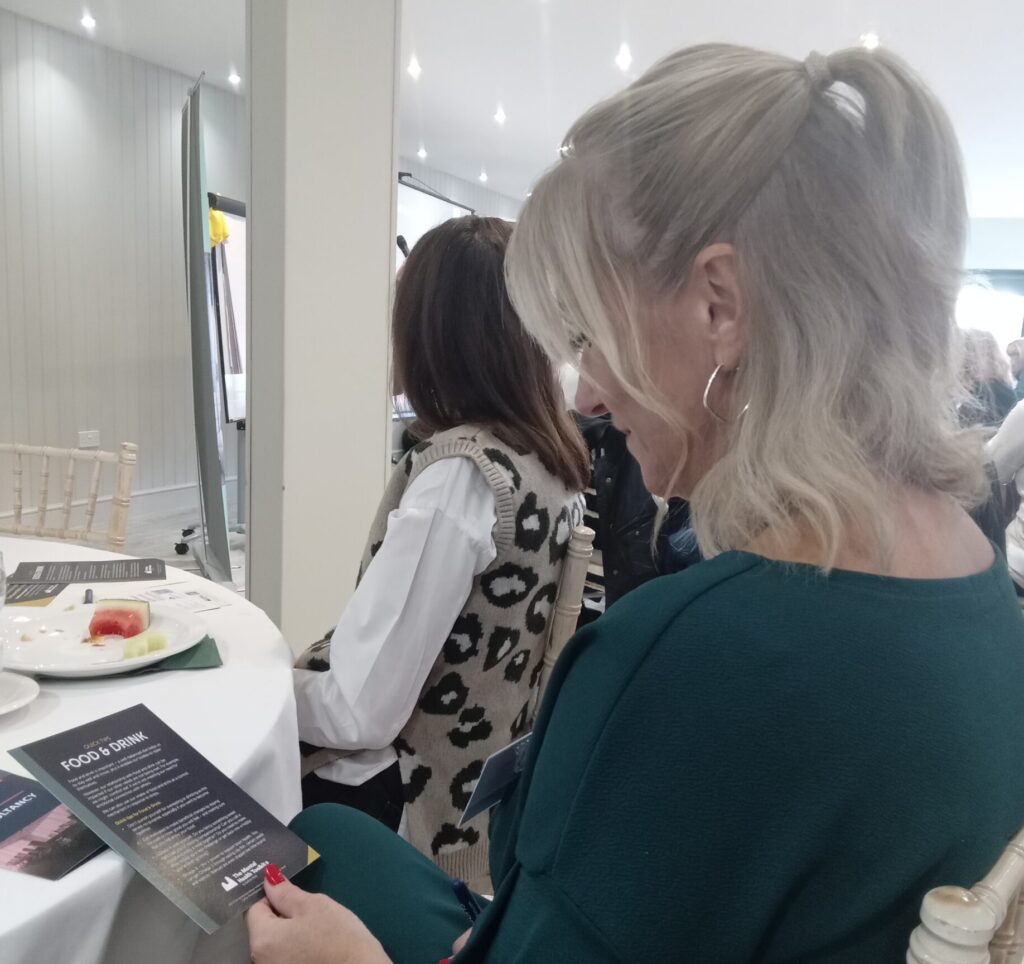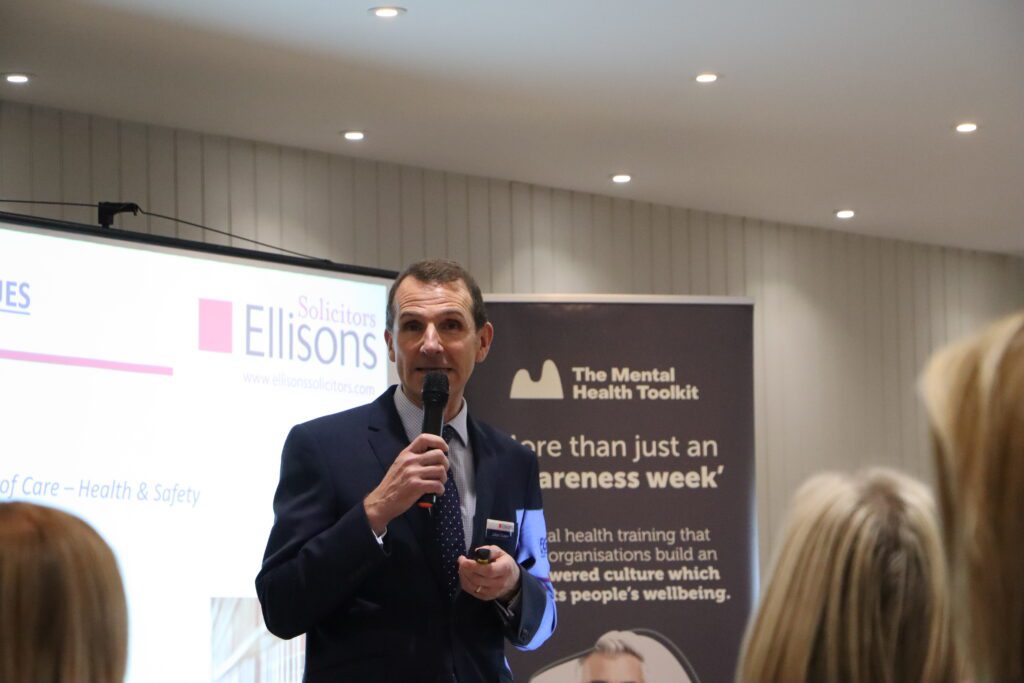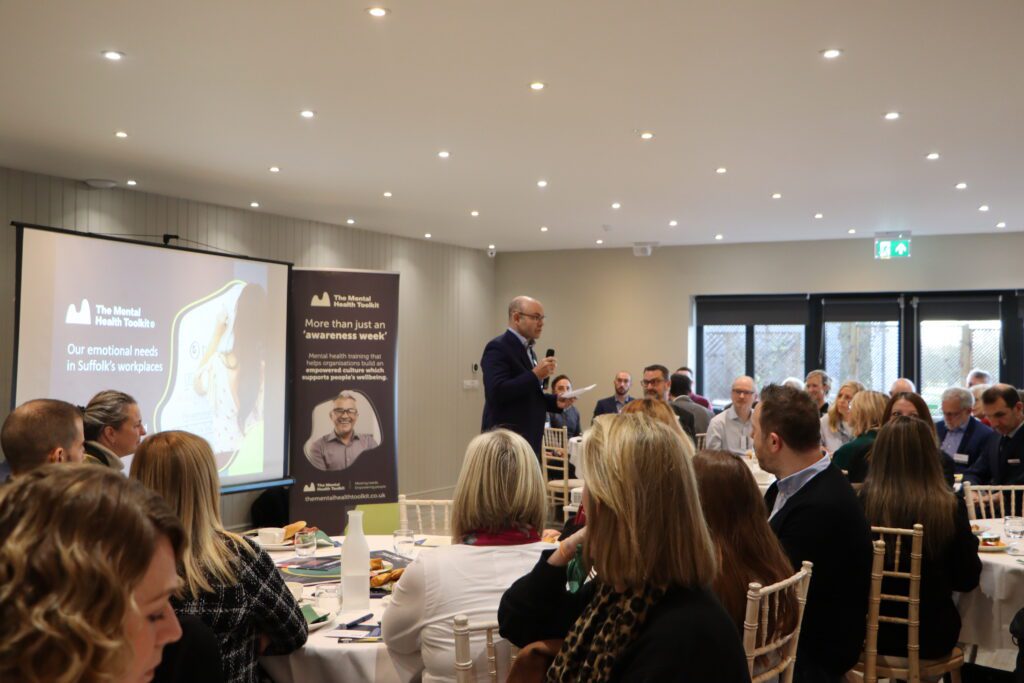Category: Uncategorized
Our new e-learning platform has been officially launched to help make mental health training more accessible for businesses.
The E-Toolkit was unveiled to guests at a business breakfast at Uniserve Group in Felixstowe on Thursday 6 June.
The online learning platform is designed to offer business employees easier access to training
Jon Neal, CEO of Suffolk Mind, said: “This unique platform has been in development for several years and is full of useful information to help employers and employees better understand their mental health and wellbeing.
“Through the E-Toolkit we want to make mental health education more accessible, meaning people can dip in and out without the time pressures of a more traditional course.
“In particular, we know businesses with teams working shift patterns find that time is the main barrier to staff accessing vital mental health training.
“A huge thank you goes to the teams at both the University of Suffolk and the University of Essex, alongside our partners at StrategiQ for making this possible.”
Training offered through the E-Toolkit includes an introduction to the Emotional Needs & Resources approach, as well as the Mental Health Continuum, split over 15 bite-sized modules.
Those cover the causes of stress, the warning signs to look out for and tools which empower people to better support themselves and those around them.
Each module includes videos, animations and articles to support different learning styles
There is also a link to take the Emotional Needs Audit, a survey to help people check in with their wellbeing while supporting Suffolk Mind’s research.
Jon added: “Since launching The Mental Health Toolkit in 2022 we have provided mental health training to businesses across the country – and the introduction of the E-Toolkit will further extend our reach.
“Feedback so far has been fantastic – including a second-place Innovation Prize from national charity, Mind – and we are confident that the E-Toolkit will prove just as popular as our existing offering.”
Enquire about the E-Toolkit via The Mental Health Toolkit.
We all have 12 physical and emotional needs which must be met for us to stay well, and a set of skills and resources we’re born with to help us meet those needs. We call this understanding the Emotional Needs & Resources approach.
One of those needs is Control. To meet the need for Control, we need to feel that we have some say over our lives and personal choices. A healthy way to meet the need for control is to recognise what we can take personal responsibility for and what we can influence and accept that there are some things which we cannot control.
Jo Flack, Trainer of The Mental Health Toolkit, shares her story and some tips on how to meet your need for Control.
Several years ago, when I was suffering with anxiety, a therapist I was working with referred to me as a ‘control freak’.
Perhaps not the most professional, appropriate or empowering terminology to use but she did have a point. I am very aware that I have a tendency towards needing a high level of control. And I’m not alone – the need for control, to have autonomy and a say over our lives, is a deep-rooted need we all share.
But like all our emotional needs it should be met in balance. That means accepting that there will always be some things that are beyond our control, such as the weather, or time.
I know all too well how we can get into difficulties when we try to control everything. My attempt to control my environment to an unhealthy degree led me to become seriously unwell with Obsessive Compulsive Disorder (OCD).
People affected by OCD experience a combination of obsessive thoughts and compulsive behaviours. The obsessive thoughts are fuelled by anxiety and focused on things which might go wrong in the future.
The compulsive behaviours are actions which seek to prevent those things from happening. Sometimes people only experience the obsessive thoughts, which is called Pure ‘O’ OCD.
My experience of OCD began as a reasonably rational dislike of ‘dirty’ things but evolved into a situation where I was attempting to sanitise my entire environment through ritualistic cleaning of myself, my possessions and spaces I inhabited.

Control is one of our 12 needs, part of the Emotional Needs & Resources approach
So, it is crucial to recognise that there are things beyond our control that we need to accept.
We might not like them, but we will not meet our need for control in a healthy way if we do not accept that some things are uncontrollable.
By accepting the things we cannot change and focusing on the things we can have an element of control over, we can help meet our need for control in a healthy balance. For example, although we cannot control the news, we can all do our bit to help control how much news we take in – such as turning off notifications on our phones, or avoiding the bulletins on TV.
For those who find their OCD symptoms worsening, take notice of what you’re thinking, label them as ‘OCD thoughts’ and try your very best to avoid giving in to the urge to control.
Here are some tips that may be helpful to meet our need for control:
- Accept the things you can’t control. This includes other people’s behaviour. It can be challenging to accept that other people’s behaviour is not ours to control, but it helps to remember that behaviour is an attempt to meet needs, whether healthy, or otherwise.
- You are in control of your exposure to media content that might ramp up worry, so you can choose to give your attention elsewhere.
- Some people find getting into a regular routine helps meet the need for control and the need for security. We feel safer when we feel in control of our day-to-day life.
And finally, remind yourself when you need to that it is enough to do the best you can.
Want to learn more?
Find out more about your Emotional Needs & Resources by booking The Essentials – our half-day workshop providing a foundation for mental wellbeing.
This workshop also forms the basis of our next-level courses, Supporting Mental Health and The Comprehensive Toolkit, to equip you with even more skills to support your own wellbeing, and the wellbeing of others.
You can also purchase a pack of our Emotional Needs & Resources cards, to help you check in on your mental health, or together with colleagues, friends or family.
Representatives from 50 local, national and international organisations highlighted their commitment to supporting and improving mental health at our networking event on Tuesday 28 November.
We welcomed more than 70 professionals to our fully booked Business Breakfast at All Saints Hotel in Bury St Edmunds, hosted in partnership with Ellisons Solicitors and Beckett Investment Management Group.

An attendee reading our Quick Tips to help meet Emotional Needs
Together, we shared approaches to creating, practicing, and maintaining good workplace wellbeing – with engagement and insights from a range of sectors, including:
- Recruitment
- Legal
- Financial
- VCSE
- Arts and Entertainment
Jon Neal, CEO of Suffolk Mind – our parent organisation – says: “Supporting our mental health is a crucial part of our lives, and our workplaces can play a big part in that.
“As we spend much of our time working, it’s essential that companies help their teams meet their physical and emotional needs.
“The huge number of attendees across numerous industries shows companies are serious about mental health.”

Julian Outen from Ellisons Solicitors
The morning included guidance from Julian Outen, Partner and Head of Employment at Ellisons Solicitors, on the legal responsibilities around workplace wellbeing. Later, Jon presented our interactive Introduction to The Mental Health Toolkit session, to give attendees a taster of our approach to mental health training.
Ian White, CEO of Beckett’s, chaired the event. He also highlighted how his company has committed to workplace wellbeing through incorporating The Essentials into their induction process.
Ian has previously said of this half-day workshop: “[The Essentials] ensures that everyone begins to understand their own mental health and creates a common language amongst the team.
“I believe it is an important foundation of creating an open culture within the organisation.”

Ian White from Beckett Investment Management Group
Jon adds: “Employers have a duty to ensure their teams are supported, and through our training they can access the skills and knowledge to do just that.
“There are also business benefits to having a team who are meeting their needs. For example, people with good mental health will often be more productive.
“Not only that, but a supportive environment can also lead to improved staff retainment.”
That’s where we come in.
The Mental Health Toolkit provides practical mental health training for organisations and individuals across the UK, helping people to support their wellbeing both at work and at home.
Explore the Toolkit to find out more about the training we offer.
And to keep up to date with our upcoming events, follow us on LinkedIn, or contact our team to sign up to our newsletter.
Wellbeing washing: what is it, and how can your organisation avoid it?
As you skim past article headlines or posts on LinkedIn, you may have seen the phrase ‘wellbeing washing’ and wondered what on earth it means. We might assume the term is promoting the benefits of personal hygiene for mental health, but that’s not the case.
‘Wellbeing washing’ borrows from the term greenwashing, used to describe companies who portray their practices as being kind to the environment, when closer scrutiny reveals that they are anything but.
In the case of wellbeing washing, examples can include leaving fruit bowls in the staff kitchen or offering lunchtime yoga, while doing little to tackle staff stress and burnout from excessive workloads, or demotivation from a lack of work that stretches them.
But employers can also be accused of wellbeing washing when their wellbeing strategies haven’t led to meaningful action, or changed employees’ working lives for the better.
What does AI say?
ChatGPT defined wellbeing washing as a ‘deceptive’ attempt to give the impression that an employer champions wellbeing. However, at time of writing, AI has yet to develop the algorithmic awareness needed to diagnose deliberate deceitfulness.
It can’t tell when it, or other people are lying. So, it’s safe to assume that ChatGPT is only regurgitating human opinions about the motives behind employer’s attempts to support colleague’s mental health and wellbeing.
It’s not that employers don’t care…
Is there a more charitable view? It’s true that our ability to empathise can be compromised when we become stressed, or when our own Emotional Needs are unmet.
With The Mental Health Toolkit, Suffolk Mind began working with CEOs, managing directors and HR professionals to address workplace wellbeing more than 10 years ago, and in that time, it’s been rare for us to meet people in senior roles whose concern and expressions of empathy felt insincere.
Arguably, employers who care only about profit margins would be unlikely to engage with The Mental Health Toolkit. Our impression is that 99 percent of people care about the mental health of their colleagues and genuinely want them to receive the help they need. So, what else could explain ‘wellbeing washing’?
Burning fires
One explanation is that people are too busy putting out fires to give attention to making effective changes to workplace wellbeing. Perhaps their workforce is still reeling from the effects of lockdown. Or, there may be lots of staff off sick with stress or recovering from personal tragedies.
If an employer is navigating a major change to their business, such as a merger, recruitment challenges, or unavoidable redundancies, they may not have the headspace to really explore the options and develop a clear strategy. And this is where we see another explanation for ‘wellbeing washing’.

Too much choice
The workplace wellbeing market has expanded so rapidly that the choice faced by potential customers is overwhelming. If we’re under pressure to decide on a solution, it’s natural to reach for the first training package with a strong brand and reputation.
Yet, while some training can raise people’s confidence when talking about mental health, this is unlikely to bring about meaningful change. Studies of some of the market leaders in mental health training show that it may make little or no difference to employees who seek support when experiencing mental ill-health from trained colleagues.
In fact, at The Mental Health Toolkit, we’ve been approached by employers who’ve tried other well-known brands to address workplace wellbeing, but found it did little more than lift people’s spirits for a day or two following the training. They then come to us because they recognise a need for an approach which changes the workplace culture overall.
And once they’ve attended a taster session, they can see that the key to change is an understanding of Emotional Needs, and how we can use our Resources to help meet them.
The workplace tribe
Management consultant, Peter Drucker, is alleged to have said: ‘Culture eats strategy for breakfast.’ But why is this? One reason is that a culture is a shared agreement – often unsaid – about how the members of that culture behave to meet their needs. As social creatures, humans learn to behave in accordance with the rules of the tribe to ensure that their emotional needs for community, attention and respect can be met.
If employees see that exchanging emails after working hours is the norm, they will assume that this is what is expected and do the same. If meetings are scheduled back-to-back and over lunch breaks, people will feel compelled to skip lunch to ensure that they are seen to be obeying the ‘rules’ of the workplace tribe.
The risk is stress, burnout and mental ill-health. And, if the culture is particularly unhealthy, people seek to meet their needs at the expense of others, which can lead to bullying and toxic behaviour.
Mutual needs satisfaction
So, how can we use this understanding to improve workplace wellbeing? The key is to reach a shared agreement about how people behave to meet their emotional needs. This includes everyone from the shop floor to the boardroom. As Duke University Psychology Professor Michael Tomasello explains, for everyone’s role in the tribe to be appreciated, the ‘we’ must supersede the ‘me.’
To reach this agreement, employees need to understand emotional needs – their own and other people’s.
This is where attending training by The Mental Health Toolkit comes in.
By developing a deep understanding of the relationship between meeting emotional needs, reducing stress, and protecting mental health, a healthy workplace culture begins to take root. People then begin to act with consideration for other people’s emotional needs. This goes beyond a strategy plastered on the office wall or repeated on everyone’s lanyard every day of the week.
No employer wants to be accused of ‘wellbeing washing,’ but there’s a bigger goal besides avoiding unwanted labels. If we’re aiming to create mentally health workplaces, where people thrive and enjoy coming to work, then satisfying the mutual needs of the employer and the employee must become our shared aim.
Explore the Toolkit to find out how our workshops and courses can help your organisation go beyond wellbeing washing and make a real difference.
Written by Ezra Hewing, our Head of Education
Senior Trainer of The Mental Health Toolkit, Penny Tyndale-Hardy looks at managing the menopause, and how to navigate the changes it can bring.
At last, it seems like society is talking about the menopause. High-profile celebrity focus, increased press coverage and storylines in soaps and dramas have put the menopause centre stage.
And let’s get this straight – the menopause affects everyone, directly or indirectly.
50% of the population will experience the menopause themselves, while the other 50% will have friends, family and colleagues affected, so it’s important that we all understand it and can talk about it in a useful way.
What is the menopause?
Like adolescence, the menopause is a natural hormonal transition – in this case caused by the fall in the hormones oestrogen, progesterone and testosterone. Physical symptoms range from the well-known hot flushes and brain fog to less reported things, such as itching and a decrease in bone density. Psychological symptoms can include anxiety, depression, loss of confidence and loss of libido.
Almost 80% of people experiencing the menopause report that at least one symptom is very difficult [1] and the whole process, from perimenopause (when symptoms begin but periods may still be occurring) to post-menopause (when symptoms end) may last a number of years.
But, with such a wide array of symptoms (and there are over 35 that have been identified) how do you know whether what you are experiencing is the menopause or something else?
Some menopause symptoms are also symptoms of different medical conditions. So, it is important that when anyone experiences a significant change in physical and/or emotional health that they check with the GP to rule these out.
Equally, not everyone will experience the same symptoms in the same way. The menopause is different for everyone, which can make it difficult to navigate the journey yourself, and equally difficult to support others, even if you have been through it.
And, while the focus on symptoms is important, it’s also vital that we don’t medicalise what is a natural process. The menopause is not an illness, and although there are medical treatments that can help, this is not always the right way for everyone.
Tips for managing the menopause
So, what’s the best way for us to manage our own symptoms, or to support someone else? If we come back to the understanding that we feel healthy and well when we are able to meet our 12 physical and emotional needs in balance, then we can begin to see some different and individual ways of managing the menopause.
For example, the menopause may affect our ability to meet our need for security, if our body is no longer behaving in a predictable way. This will also affect how in control we feel, which can in turn increase our anxiety.
If menopausal symptoms are affecting our sleep, then this has knock-on effects for both our physical and mental health and we may need to change our patterns and habits in order to prioritise our sleep in a different way.
Experiencing brain fog may well affect our sense of achievement and our attention capacity, while others may find that withdrawing from some activities means we’re not meeting the need for community or emotional connection.
When we don’t meet these needs so well, it affects how we respond to other aspects of our lives. Our ‘window of tolerance’ for managing the everyday ups and downs of life may become narrower as we are dealing with the uncertainties and discomforts of the menopausal symptoms as well as everything else. It is important, therefore, to be kind to yourself and find ways to help mind and body relax, such as through breathing techniques or relaxation exercises.
What help is available from The Mental Health Toolkit?
When there is a barrier – such as menopause symptoms – to meeting our needs, we need to look at what we can change so we can meet these needs once more. Because everybody’s symptoms are different, it follows that each person’s solution will also be different.
There’s loads of advice and interventions out there – including different HRT packages, nutritional supplements, exercise programmes, sleep support, relaxation and peer support groups. Getting access to all the options in one place is a great start.
The Mental Health Toolkit has designed a course to raise awareness of how the menopause affects people in your organisation.
Menopause in the Workplace is an interactive one-day course that will help you and your team to:
- Gain a new perspective on the menopause
- Learn practical tools to support colleagues experiencing the menopause
- Learn tips on how to write and implement a supportive menopause policy
Visit our webpage to find out more, or contact our team for more details.
References
[1] Statistics from the report by The Fawcett Society on peri/menopause (4,000 contributors)
At The Mental Health Toolkit, we work with organisations of all shapes and sizes, including other charities and not-for-profit businesses.
In June 2023, we were invited to Orwell Housing Association’s summer staff conference, as part of their 60th birthday celebrations.
Orwell provides homes for more than 7,500 residents across East Anglia, as well as care, housing management, and property services, among others.
No surprise, then, that this was our biggest audience yet, with more than 300 colleagues in attendance at the atmospheric Thorington Theatre.
We joined the team after lunch to present an extended version of our Introduction to The Mental Health Toolkit session, which included:
- A Mental Health Continuum Q&A
- An Emotional Needs challenge
- A 7/11 breathing demonstration, to help colleagues keep calm
Using giant Emotional Needs & Resources cards, and our trademark interactive style, we were able to keep this large audience engaged, while getting them thinking about our approach to workplace wellbeing.

Wendy Evans-Hendrick at Thorington Theatre.
Credit: Orwell Housing Association.
Wendy Evans-Hendrick, CEO at Orwell Housing Association, said:
“At Orwell, we understand that wellbeing goes beyond physical health; it encompasses their mental health, emotional and social wellbeing. By providing opportunities, like working with The Mental Health Toolkit, we aim to cultivate a culture that celebrates diversity, encourages open communication, focuses on wellbeing, and fosters a sense of belonging.
“We found the session from Jon Neal and the team at The Mental Health Toolkit insightful and entertaining. It’s important to be aware of where you are on the continuum and that there are tools out there to support people back to feeling well.”
Jon, our Chief Executive who led the session, said: “Thank you very much to Orwell Housing Association for inviting us to be a part of your awesome event. What a great place to work.”
Meanwhile Wendy, our Corporate Relationships Manager who was on hand with the mic for the Q&A session, added: “It was great to be a part of it and thanks for your hospitality. We thoroughly enjoyed ourselves.”
We look forward to working with the team at Orwell Housing Association again in the future. You can read more about our work with them in our Case Study.
Find out more about our suite of workplace wellbeing workshops and courses by exploring the Toolkit.
We were so proud to share our programme of mental health courses, and our approach to mental health at the University of Suffolk last week.
Hosted on 19th May to mark Mental Health Awareness Week 2023, our Spring Business Breakfast encouraged local, national, and even international companies to start conversations around supporting wellbeing in their workplaces.
We were delighted to be joined by representatives from a diverse range of organisations and industries, including:
- Shipping and Logistics (Bleckmann, VARTAN, Uniserve)
- Energy and Utilities (EDF, Pitkin & Ruddock Ltd)
- Construction (Barnes Construction)
- Legal (Smith & Co Solicitors, Bates Wells & Braithwaite Solicitors)
- HR and Recruitment (polkadotfrog, Lighthouse Personnel Ltd)
- Education (IKON Training, University of Suffolk)
- Public Sector (Suffolk Fire & Rescue Service)
- Design and Marketing (Hudson Group, GLO – Generate Leads Online)
The networking event included introducing the Emotional Needs & Resources approach to a fresh audience, sparking meaningful conversations and ideas for attendees to take back to their teams.
To round it all off, we enjoyed a debrief and a delicious new smoothie – the ‘Berry BrainWave’ – over at Paddy & Scott’s café on Ipswich’s beautiful waterfront.

Josh Vartan from Vartan, Steve Grimley from Uniserve and John Parnell from GLO, at Paddy & Scott’s
Want to join our next Business Breakfast?
We’ll be hosting another workplace wellbeing networking event in the autumn.
If you’d like to find out more, please get in touch with our team.
We are more than just an awareness week
The Mental Health Toolkit’s suite of workplace wellbeing training courses will help your business to go beyond Mental Health Awareness Week, so you can continue to support wellbeing in your team.
Explore the toolkit to find out more, and to book the right course for your organisation.
We’re pleased to share that one of The Mental Health Toolkit’s workshops won at the East Suffolk Awards 2023, at a ceremony that took place at Snape Maltings on Tuesday 28 February.
Our parent organisation, Suffolk Mind, won the Health and Wellbeing Award for our half-day session, The Mental Health Toolkit: The Essentials.

Jon Neal (pictured left), CEO of Suffolk Mind, said: “We are absolutely thrilled to have won this award.
“We are very proud of The Mental Health Toolkit and know it has the power to make a real difference. We are incredibly grateful to East Suffolk Council, and all the award sponsors, for their recognition and look forward to continuing on our quest to make Suffolk the best place in the world to talk about and take care of mental health.”
This half-day training session introduces you to the Emotional Needs & Resources approach, and equips you with the tools, skills and knowledge to look after your mental health, as well as that of those around you – as well as those around you.
Wendy Sheppard – our Corporate Relationships Manager (pictured right), said: “We had a fabulous evening. It was a pleasure to meet lots of new people who are also making a big difference in their local communities – well done to everyone that attended.”
Book this workshop
You can book yourself, your colleagues, or a whole team onto this workshop via The Essentials page.
Or, get in touch with the team to find the right tools for your organisation’s needs.
Interested in our other courses and workshops? Explore the Toolkit to find the right one for you.
Our beginnings
The history of The Mental Health Toolkit begins with Suffolk Mind.
Suffolk Mind have always provided mental health courses for the public. Then, in 2010, we started getting calls and emails from HR professionals, looking for the knowledge and skills to support employees with their mental health. This led to the development of our workplace wellbeing service. Over the last decade, it has grown into a team of highly skilled and in-demand trainers delivering our courses and workshops across the UK.
We knew from the very start that we wanted to go beyond the kind of training which just lists the symptoms associated with depression, anxiety, OCD and so on. People can easily find these on the internet. Most importantly, just knowing the symptoms won’t tell you how to prevent them from arising in the first place, nor will it help with recovery.
Instead, we started with the insight that unmet emotional needs cause stress, which pushes us down the mental health continuum. When company leaders and HR professionals attend our training, or hear us speak about emotional needs, they can see the difference immediately.
What is so different?
Firstly, if your workplace culture allows people to meet their emotional needs in healthy ways, they and the organisation will thrive.
Secondly, focusing on emotional needs and the skills to meet them, puts people in the driving seat. They are now empowered to identify and meet their needs, together with support from health professionals when required.
Thirdly, realising that we all have emotional needs which have to be met to stay healthy, normalises mental health without having to talk about stigma.
We all have emotional needs, and we are all on the mental health continuum. That knowledge can start to change a workplace culture.
It’s also heart-warming to hear back from the organisations we work with, who frequently tell us what a difference these ideas have made. Sometimes we hear from someone who has used what they learned to prevent a suicide. But sometimes it’s small changes, like improvements to employees’ quality of sleep.
These results all add up over-time. Over a decade on, and we’re in a world which faces new challenges to mental health. We’re glad we made the choice to pursue an approach to workplace wellbeing which makes meeting emotional needs the shared focus of the wider working community.
The future of The Mental Health Toolkit
We’re building upon our strong reputation for excellent workplace wellbeing training in Suffolk and further afield across the UK.
The Mental Health Toolkit is the next chapter in our mental health training. We’ve renamed some of our workshops and our training has a new, fresh look. What we’re not changing is the high-quality delivery and content of the training we have such a reputation for.
By visiting our website, and experiencing our training, you can have a huge impact on your mental wellbeing, and the wellbeing of those around you.
